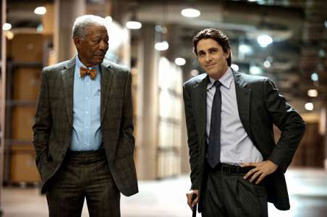|
|
Movie Review: The Dark Knight RisesBy Edwin DaviesJuly 23, 2012
That trend continues with Nolan's final film in the series, The Dark Knight Rises, which finds him engaging with the underlying resentment between the mega-rich minority and the poor majority in the wake of the global recession, which in recent years has given rise to the Occupy movement, and stoked the flames of class war to an intensity that has not been seen in decades. It is this animosity that the film's masked villain, Bane (Tom Hardy) manipulates in his plan to destroy Gotham city; by drawing upon the poor, the disaffected and the disenfranchised, he seeks to act as "Gotham's reckoning," and to put an end to the decadence of a city whose elites have, to paraphrase Selina Kyle (Anne Hathaway), lived too large for too long, leaving so little for the rest of its citizens. Once again, Nolan infuses his superhero opera with real world concerns, lending a great weight to proceedings whilst raising difficult questions about society that he disconcertingly chooses not to answer. The film takes its time reaching that point, though. In fact, in stark contrast to its predecessor, which all but started with Batman kicking ass and taking names, it takes its time even getting to Batman. When first we meet Bruce Wayne, we learn that he has become a Howard Hughes-like recluse who has withdrawn from a world he has helped to reshape. Following the death of the half-mad Harvey Dent, for which Batman took the blame in order to protect Dent's reputation, the city introduced legislation giving the police sweeping powers to tackle organised crime. This has led to the city becoming a place that no longer needs Batman, primarily because its clandestine protector has been replaced by a police state.
|

|
|
|

|
Friday, November 1, 2024
© 2024 Box Office Prophets, a division of One Of Us, Inc.


